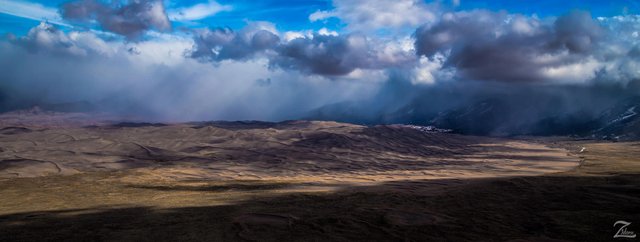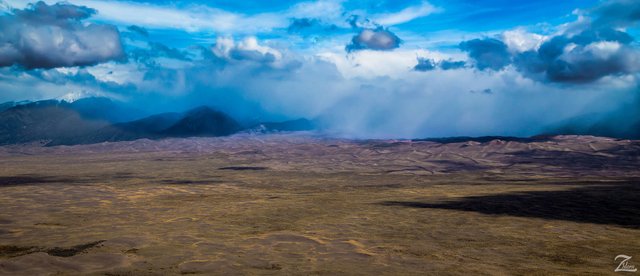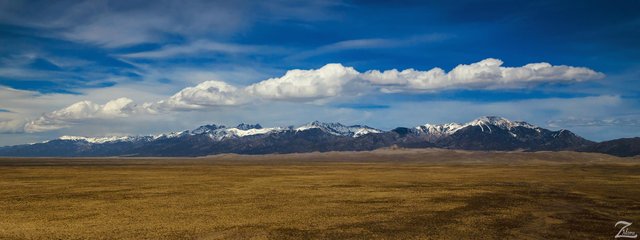The Great Sand Dunes National Park is brushed by rain underneath a localized rainstorm. Please open full screen to really experience these images.
Clear skies shine bright blue above the rainclouds in this image I lensed while exploring the wilderness of the Zapata Ranch on the high desert of San Luis Valley in Colorado.
Looking to the northeast at the Great Sand Dunes National Park you can see the near perfect semi-circular border pattern on the ground between the sand dunes and the edge of the desert floor on the right side of this image.
This image is the right side photo to a pair of images I lensed of this rainstorm. The other image was featured in this previous post here. And below is the other image which is geographically on the left side of the image above:
Great Sand Dunes National Park contains the tallest sand dunes in North America which rise to a maximum height of 750 feet / 229 m, from the floor of the San Luis Valley on the western base of the Sangre de Cristo Range.
The dunes cover an area of about 19,000 acres / 7,700 ha. Researchers say that the dunes started forming less than 440,000 years ago and were created from sand and soil deposits of the Rio Grande and its tributaries, flowing through the San Luis Valley.
Over ages, the glaciers that fed the river and vast lake that existed across the valley melted away, and the water evaporated. Westerly winds picked up the exposed remaining sand particles from the dry lake and river flood plain. As the wind eventually lost power prior to crossing the Sangre de Cristo Range, the sand was deposited on the east edge of the valley, creating the piled up dunes we see today.
This process still continues, and the dunes are slowly growing. The wind changes the shape of the dunes daily as it continues to move sand from the middle of the valley northward.
(Research Source)
The following image is of the Sangre de Cristo Mountain range which towers above the Great Sand Dune National Park. You can see the dunes at the base of the mountains on the right side
These are the towering mountains of the Sangre de Cristo (Spanish for "Blood of Christ") the southernmost subrange of the Rocky Mountains.
What I love about this image is that the clouds above the mountains are mirroring the shape of the mountains but in the sky! I call this image "Mountains In The Sky".
This range runs from Poncha Pass in South-Central Colorado, trending southeast and south, and ends at the Glorieta Pass, just southeast of Santa Fe, New Mexico. This range used to be called "La Sierra Nevada", "La Sierra Madre", "La Sierra", and "The Snowies" (used by English speakers).
In 1719 the Spanish explorer Antonio Valverde y Cosio named the range Sangre de Cristo ("Blood of Christ") mountains after being impressed by the reddish hue of the snowy peaks at sunrise, alpenglow.
(Research Source)
Folks I really appreciate you taking time to check out these images and my work. I do hope you enjoy learning about these remarkable places and seeing these sites that are so rarely experienced.
These images and the overall story are from my ongoing project in which I am trying to raise awareness of the 47% of the USA and 90% of Canada that remain unpopulated wilderness.
Where Eagles Fly - The American Wilderness Expedition is my personal mission to introduce people to these amazing locations that surround us.
If you like what you see here upvote then resteemit so that others may experience these wondrous places as well. And if you'd like these images to be part of your feed then follow me.
Yehaw!!



thx for sharing
Downvoting a post can decrease pending rewards and make it less visible. Common reasons:
Submit
It looks so beautiful there! Peaceful, and fresh. Yes it's cool how the clouds are mirroring the mountains. Love it!
Downvoting a post can decrease pending rewards and make it less visible. Common reasons:
Submit
amazing place. would like to know more about it ;)
Downvoting a post can decrease pending rewards and make it less visible. Common reasons:
Submit
These amazing photos and the information is very much appreciated. I am learning much from your posts exactly how beautiful the wildness is.
Downvoting a post can decrease pending rewards and make it less visible. Common reasons:
Submit
Thanks so much! I just followed you and love your Yeti posts!! Very cool
Downvoting a post can decrease pending rewards and make it less visible. Common reasons:
Submit
Thank you, sir.
Downvoting a post can decrease pending rewards and make it less visible. Common reasons:
Submit
amazing place👌👌👌👌It looks so beautiful there.👌👌👌👌
Downvoting a post can decrease pending rewards and make it less visible. Common reasons:
Submit
Is an incredible place! The pictures look dramatic and masterly!
Downvoting a post can decrease pending rewards and make it less visible. Common reasons:
Submit
@skypilot Awesome posts sir... I thoroughly concur along with you. Adore it..
Downvoting a post can decrease pending rewards and make it less visible. Common reasons:
Submit
More awesome photos from your good self!!!!
Downvoting a post can decrease pending rewards and make it less visible. Common reasons:
Submit
Absolutely stunning posts you have here Sir, lovely write ups too.
Following 😉
Downvoting a post can decrease pending rewards and make it less visible. Common reasons:
Submit
Thank you Jamie, glad you enjoy them and thanks for your kind words.
Downvoting a post can decrease pending rewards and make it less visible. Common reasons:
Submit
@skypilot Amazing job! Followed.
Downvoting a post can decrease pending rewards and make it less visible. Common reasons:
Submit